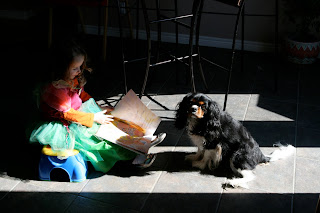
Good Morning America had an interesting segment this morning regarding how babies and toddlers learn language from their parents. Speaking baby-talk to young children, like when parents make silly noises, can cause delays in how speech and language is learned. The experts suggested the following for improving children's language development:
-pick up on your child's cues. If he or she expresses interest in something like a toy or object, immediately capitalize on this interest by first naming the object and then describing it (e.g., "That's a ball. Balls are round. That ball is red."
-name things in different ways in order to situate the noun in various contexts (e.g., "Those are fish in the tank. The fish swim in the water. Those orange fish move fast!")
-engage in 'motherease' speaking, where the natural rhythms and cadences of language can be expressed by lengthening the words in a sing-song approach to speaking. This differs from speaking in 'baby talk' where gibberish is used as language. (e.g., "Loook at the puuuuppy. Theeee puuuuppy is cute!"
-speak as much as possible to your children, even before they are able to respond. Expose your children to as much oral language as possible. Name things for them when in the grocery store (e.g., Those are cans of food. The broccoli is green.") or during diaper changes (e.g., "Here are your toes! Here is your tummy!")
-young children love looking at human faces. When speaking to your child, try and have your face close to theirs so they can see your expression and how your mouth moves when speaking
-read a variety of stories to your children. Aim for at least one book a day. Reading allows a parent to alter their voice to match situations and characters in the story. Young children love hearing this variation in language.
-enlist the help of older children and family members who can engage your baby or toddler in conversation when you are unable to do so



No comments:
Post a Comment